🌟 Developer Spotlight: Squimmy
2022年 12月 25日

(2022) Glub-Glubmarine, a puzzle game where you must escape a leaking submarine before you run out of air.
I am an expert at starting projects and an expert at abandoning them long before they ever reach the finish line. I often doom myself to failure before even getting started because I overscoped right out the gate. I’ll set out to write short fiction, but before I know it, my notes have ballooned to the point that I am staring down an entire epic saga, of which I have neither the time nor ability to see to fruition.
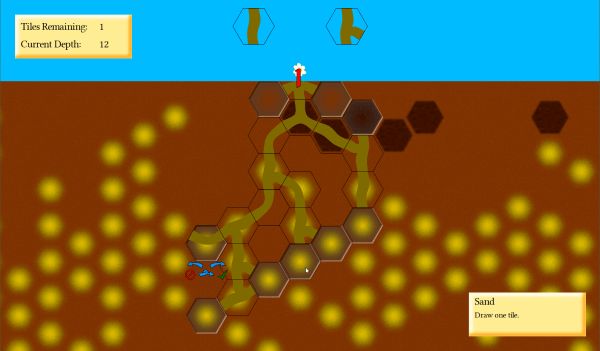
(2021) Radication, a tile-placing game where you are a plant laying down your roots through different types of soil.
This is why I am in complete awe of game developers who participate in game jams. Making a game means dealing with coding, creating art and music assets, quashing bugs, and so much more, all in what is usually a strict time frame. But for some people, what should be an impossible task is instead a chance to do a whole lot of experimentation and let their creativity run loose. Because they are forced to keep their scope focused on one or two mechanics at most, they can expound on their core theme to create something extravagant and unique.
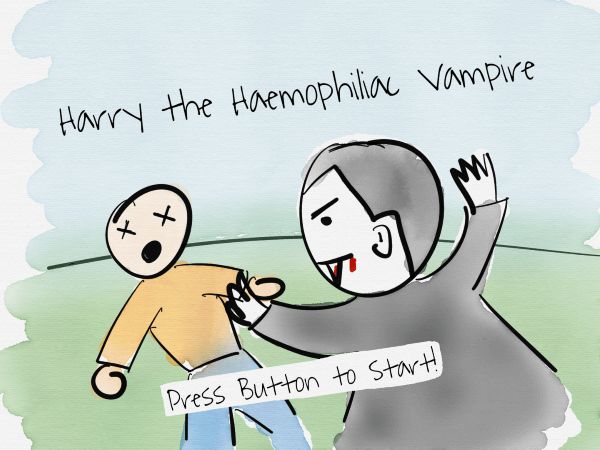
(2022) Harry The Haemophiliac Vampire, a top-down action game where you run around and, uh, “borrow” blood from people.
Some game jam entries end up getting expanded releases down the line, or having their mechanics recycled and incorporated into larger works. But just as there are short stories that never get turned into longer novels, there exist a lot of game jam titles that end up being complete experiences on their own: unique and perfectly whole as a succinct, experimental work. It is in this space that game developers like Squimmy really shine.
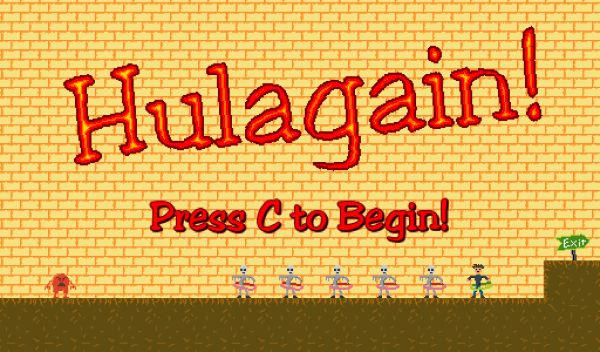
(2020) Hulagain, a side-scrolling puzzle-platformer where you shake your hips and keep the hula hoop up as you make your escape out of hell.
My introduction to Squimmy’s games was Hulagain, an entry to Ludum Dare 47 (“Stuck in a loop”). You find yourself in what looks like an aerobics class in hell, with a demon ordering you to hula hoop for eternity. “You don’t wanna find out what happens if your hula hoop touches the ground!” After demonstrating that you’ve got the basics down (moving right and left in rhythm with the hoop to keep it from dropping), the demon leaves and you spot your chance to escape.
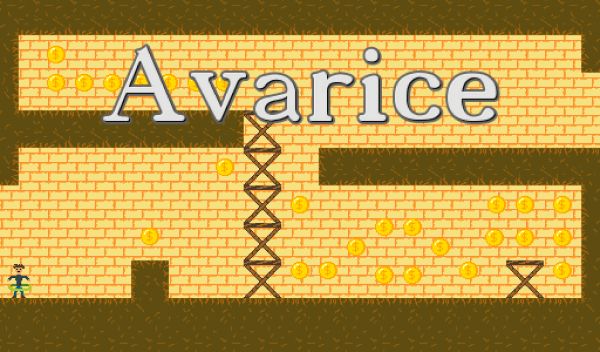
Are you seriously telling me you WOULDN'T go out of your way to pick up these coins?!
What follows is a series of platforming levels, with new mechanics and layouts themed around the sins you must commit to pass. My favorite was the Avarice level that is full of coins, but collecting them means having to take the long way around and double back often. Skipping the coins is faster, but what kind of gamer wouldn’t try to collect every coin on the screen? And the whole time, you need to keep up your hula hooping because if it touches the ground, the stage resets. Each level is short and there is no game over state, so there is that “just one more time” sensation that pushes you through your failures to keep trying.
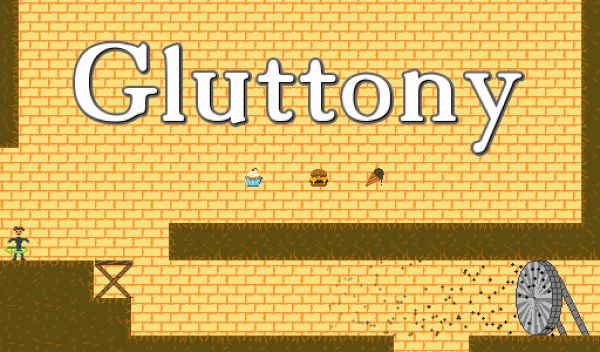
The Gluttony level has you eating snacks to bulk up enough to withstand the fan blocking the exit.
Hulagain is remarkable because it is almost maddening trying to keep the hula hoop up while jumping around platforms and avoiding enemies; yet even I, someone who has very little patience for punishing games, finished it one sitting. It takes a control scheme that you would never find in a commercially released product and makes it the foundation of the entire game, and has the leeway to do some very funny things with that premise. (I hope this isn’t a spoiler, but I must say that the way you get out of hell by passing through limbo and then entering heaven made me cry with laughter. I loved it so much.) This is the kind of experience you can only get with short-form games, a staple of game jams.
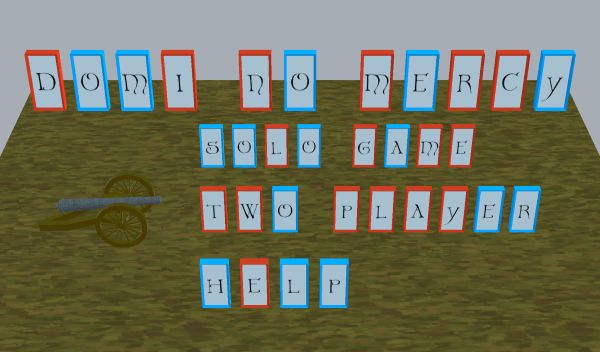
(2021) Domi-no-mercy, a two-player strategy game where you knock over your opponent's dominoes.
Squimmy’s game portfolio is laid like some of my favorite short fiction anthologies: a little of everything, all of it a little weird and very cool. It is full of the hallmarks of an artist experimenting with new tools or engines and seeing what they can do with the medium. There is Radication, a tile-placing game where you must help a plant extend its roots as deep as it can for precious water, made for LD 48 (“Deeper and deeper”). There is the strategy game Domi-no-mercy for LD 49 (“Unstable”) that can be played locally with one other person, where you maneuver around a model town and try to knock your opponent’s dominoes off the table.

(2022) あっ!ためて!
Ah! Warm Up!
And there is my favorite of all, あっ!ためて! (Ah! Warm Up!) made for Unity1Week 「ためる」 (tameru, collect, store up). I’ve mentioned before that I love dajare puns that require long explanations. So here we go: You play as a dragon who is reading about the spike in energy prices hitting the Japanese public this winter, and you want to help out. You need to store up (ためる, tameru) your energy and blow out fire to warm up (あっためる, attameru) the masses. But あっ (ah!), don’t set them on fire! It is incredibly silly, and I love it to pieces. The digital watercolor artwork is charming and cute, and the game is at once very simple (there is only one button) and quite difficult (I keep setting people on fire, ah!).

(2022) ReSeArCH, a frantic game where you click on Re atoms while avoiding the other elements to keep your rhenium as pure as possible.
Squimmy’s games demonstrate the wide range of creative possibilities that are available if you rein in your scope and keep your focus on trying out one new thing, rather than let your project spiral out of control. I hope that by playing Squimmy’s and other jammers’ games, you can get inspired to experiment with your own work. Doing so can also help you better appreciate the experimentation that goes into honing the individual components of the large-scale games you like and play. I am looking forward to seeing what new things Squimmy comes up with next!
